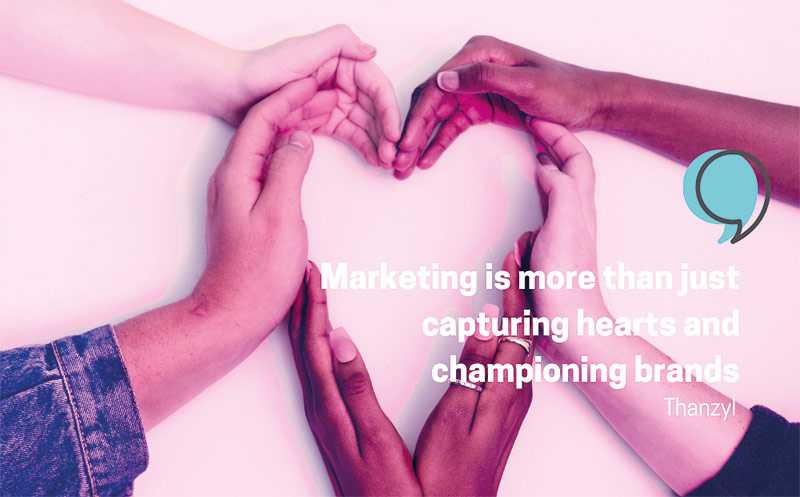Wednesday Feb 18, 2026
Wednesday Feb 18, 2026
Monday, 21 December 2020 00:02 - - {{hitsCtrl.values.hits}}

 Gone are the days where one vaguely segments and targets consumers. Brands today realise that it’s a human being they’re dealing with. We love a unique, personalised experience.
Gone are the days where one vaguely segments and targets consumers. Brands today realise that it’s a human being they’re dealing with. We love a unique, personalised experience.
Behavioural marketing just does that. It gives great insights into the actual behaviour of consumers by learning their various activities. This enables us to have a more realistic and meaningful engagement. Online marketers are truly lucky in this regard; they can easily track and measure the whole customer journey.
The other part to this is learning human emotions. This is not something new; psychology in marketing has been there throughout. In an increasingly sensitive world, emotional marketing is something one cannot afford to ignore today. It’s important to know how consumers evaluate brands and what makes that special connection. It goes beyond just storytelling. It touches one’s heart and not the temporary mind.
Digital and social media will require niche thinking
The whole digital landscape especially social media is overcrowded with new technologies, new media, and new tools. This new virtual world only keeps expanding exponentially. It’s very unlikely to plan and executive a unified digital marketing strategy. Luckily every social media network or sharing site out there today stands for something; it has a specific audience for brands to target.
Then there are various hyper-focused niche social networks that we haven’t even heard of. Using the right platform at the right time with the right messaging is key to success, whether you simply want to sell your product or convince an entire group to buy into an opinion or policy your brand is trying to achieve.
Brands will have to get onboard with those who are experts in either one or two or more of these platforms, and not just have one person overlooking the entire digital marketing aspect which is the case with many local companies here.
Content marketing will always be king
How you create and distribute your messages in a meaningful and impactful way continue to be a priority. Increasingly, the ‘content’ in content marketing seems to dominate everything else. It’s all about being clever at this point.
Today many brands measure their success in just how many million views on a video they acquired in just a few days, or how many share or mentions that goes around for a particular topic. Again, psychology plays a major role here. They say that everyone is a content creator today, but only a few are content marketers.
Reputation will stir boardroom discussions
Companies are now giving importance to what their reputation among various stakeholders look like. They understand that having an in-depth knowledge about their character and identity is just as important or probably more than their revenues and plans.
Strategic communications have become an integral part of the boardroom today, with more weight given towards digital. Brands that have suffered a crisis know this, but with the recent coronavirus pandemic, it’s likely that every brand- regardless its size, origin and type- know the true meaning of reputation and just how important it is to manage all elements that make up their reputation.
Collaborations will be a strong marketing strategy
With many brands looking at spending less yet gain more sales and traction, pursuing a collaborative marketing strategy has proved to be highly successful. Leaving individualism and selfishness aside, brands are now teaming up and creating something very exclusive and appealing.
We see entrepreneurs and startups taking a lead in this regard, and we also see the countless number of co-branding, mergers and partnerships among corporations. It’s definitely a commendable attitude. Some brand personalities complement so well with each other.
Thinking and acting social is no longer an option
CSR and sustainability isn’t just another fancy tactic used today. Consumers are increasingly conscious of how the brand thinks and act socially, in other words, its social purpose. Many consumers especially the younger generations make brand choices purely based on social aspect. They expect the brand to have many social efforts. It’s very obvious that a brand that doesn’t have this isn’t likely to succeed in the long term.
This is not another strategy to pursue like societal or social marketing, the social aspect need to be embedded and firmly rooted in each and every aspect of the business. This is never an easy task to achieve especially when it doesn’t meet the financial interests of investors and other stakeholders.
Stakeholder acceptance is crucial to its success, and marketers will have to make this happen. There are many brands that have succeeded in connecting their goals with societal needs.
Employees will turn into intrapreneurs
Many companies are recruiting those with good entrepreneurial traits and skills who challenge the company’s status quo way of thinking. They are called intrapreneurs, and are primarily and directly responsible for driving innovation or a project within an organisation.
They have excellent problem-solving and decision making skills. They’re particularly noticeable in many large corporations that find it hard to sustain the entrepreneurial spirit it once had, avoiding any stagnation. Regardless the size or type, many companies are now grooming their employees to be intrapreneurs.
Direct sales will turn to human-to-human marketing
Door-to-door sales is a concept that is probably dead today. It’s rather fascinating to learn that some are leveraging this as an opportunity as people continue to stay back and work from home during this pandemic. The same goes to traditional cold calling or the old-fashioned direct mail.
A majority of the population in many countries still aren’t familiar with various technology. Let’s face it, no connection could compare to that of meeting in person and building relationships face-to-face. We are humans, it’s our basic instinct. Surprisingly these so called old-school methods are not quite dead. It has only been rephrased to human-to-human (H2H) marketing, and this is increasingly important in a digital world where there isn’t much of human touch.
Marketing automation will continue to rise
Big data automation is happening almost across all industry sectors today, enabling one to increase operational efficiency, sales, and an enhanced customer experience. The technology continues to evolve rapidly. Robotics, analytics, and artificial intelligence (AI) especially machine learning are reshaping the business landscape.
With increased innovations and competition, marketers are increasingly challenged to make evidence-based decision making faster. They are investing in these technological advances than never before. Various recent surveys show that automation is more important as a skill.
Marketers will be strategic leaders
Traditionally, marketing has always been about sales whether we like or not. And this sadly continues to be the truth in many companies here. This is changing. We see many marketing professionals leading the organisations today.
They’re not just responsible for the overall sales, profitability and health of the organisation but also for its innovation, reputation, sustainability and creating entrepreneurial change. They are increasingly required to be an all-rounder with the ability to lead and give directions. Many marketers recently have also shown keen interest in acquiring skills in other related disciplines such as finance, people, supply chain and so on.
(Thanzyl Thajudeen is a senior marketing consultant. He can be reachable via [email protected])